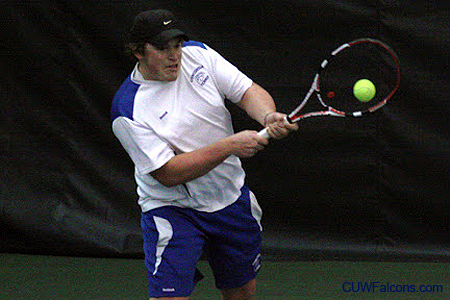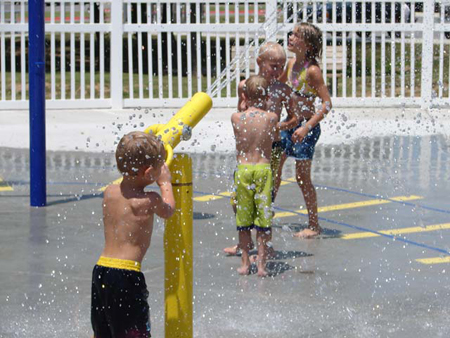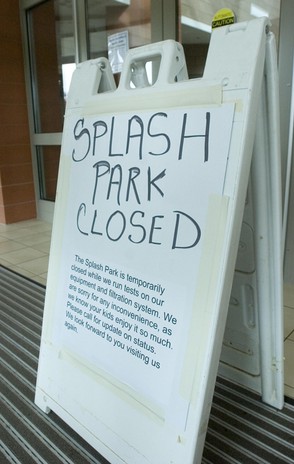A cryptosporidium outbreak has emerged in Cairns, Queensland (that’s in Australia) with 51 cases in a month when the usual number of yearly cases was below 20.
"If you’ve got 51 cases confirmed in a lab, chances are there are hundreds out there," Public Health medical officer Dr Steven Donohue said.
In the letter, Dr Donohue instructed day care centres to exclude children with diarrhea until they have not had symptoms for 48 hours.
He also recommended that swimming pools at day care centres be disinfected with adequate  chlorination or refilled after each session.
chlorination or refilled after each session.
Queensland Health is also in the process of notifying swimming pool operators about the health risk, Dr Donohue said.
"We’re not blaming the pools but they are a known factor in magnifying the outbreak," he said. "The pool operators should be very careful to make sure children with diarrhoea or dirty nappies are not in pools."
In other crypto news, Artieda et al report in Eurosurveillance that on 24 November 2011, some smart pediatrician in the Basque Countr of northern Spain notified the epidemiological surveillance service of Gipuzkoa of a child with diarrhea in whose stools oocysts of Cryptosporidium had been isolated, as well as of an unusually large number of children with diarrhea who attended the same day-care center as the first child. All were tested for Cryptosporidium.
Investigators concluded that from October to December 2011, an outbreak of 26 cases of cryptosporidiosis occurred in a day-care centre in Gipuzkoa, Spain. The infection spread from person to person and affected 24 children under two years of age (attack rate: 38%) and two caregivers. Cryptosporidium oocysts were observed in 10 of 15 samples. During 2010, only four cases of cryptosporidium were detected in Gipuzkoa, and 27 overall in Spain.
At the time of the study, 63 children between 0 and two years of age attended the day-care, as well as the staff that consisted of six caregivers. There were 39 1–2-year-olds in classroom 2 (ground floor) and classrooms 3 and 4 (first floor), 13 in each. In classroom 1 (ground floor) and classrooms 5 and 6 (second floor), there were 24 0–1-year-olds, eight in each. A total of 24 children fell ill (attack rate: 38.1%), and only three of them were in the group of 0–1-year-olds. Children shared some activities by age group. Two caregivers also fell ill. In the microscopic analysis, Cryptosporidiumspp. oocysts were isolated in 10 of 15 stool samples, and no other enteropathogen was found in any of the samples studied.
In addition, an environmental investigation was also undertaken by the local public health technicians. Information on hygiene practices and water usage was collected. The investigation detected deficiencies in hygiene procedures in the day-care centre. Single use paper towels were not available in any of the risk areas.
As soon as the outbreak was confirmed, strengthening of hygiene measures was recommended to the staff of the day-care center, and they were asked to advise taking children to their pediatrician in the event of more cases. The recommended measures involved correcting the above-mentioned deficiencies, improving compliance with universal hygiene rules and, given the characteristics of the microorganism (resistance to chlorine), cleaning surfaces with 3% hydrogen peroxide. All measures recommended were implemented within 24-48 hours.
A letter was sent to the parents informing them of the outbreak and advising good hygiene practices. In addition, they were told that those with diarrhea must not to use public swimming pools or other recreational water facilities for the duration of the outbreak.
The full report is available at http://www.eurosurveillance.org/ViewArticle.aspx?ArticleId=20070.
 seemed he was in trouble.
seemed he was in trouble.
.jpg) became public Tuesday. It is believed that for every confirmed case in a crypto outbreak, there are 98.6 additional cases, Robinson has said.
became public Tuesday. It is believed that for every confirmed case in a crypto outbreak, there are 98.6 additional cases, Robinson has said. came home to the college as planned. The others, we’ve been told, came home late or were heading home Monday evening.
came home to the college as planned. The others, we’ve been told, came home late or were heading home Monday evening. chlorination or refilled after each session.
chlorination or refilled after each session. Department on Thursday.
Department on Thursday..jpg) pool. It got into the filtration system and they charged us to clean it. That was expensive. He took a $6,000 dump in the pool!”
pool. It got into the filtration system and they charged us to clean it. That was expensive. He took a $6,000 dump in the pool!” gastrointestinal illness,” said Dr. Mary McIntyre, medical officer of the ADPH’s Bureau of Communicable Disease. The Splash Pool appears to be the common area of exposure at this time, according to that same ADPH release.
gastrointestinal illness,” said Dr. Mary McIntyre, medical officer of the ADPH’s Bureau of Communicable Disease. The Splash Pool appears to be the common area of exposure at this time, according to that same ADPH release..jpg) Pools should also not allow non-potty trained children to be in them until further notice.
Pools should also not allow non-potty trained children to be in them until further notice..jpg) closed for super-chlorination.
closed for super-chlorination.